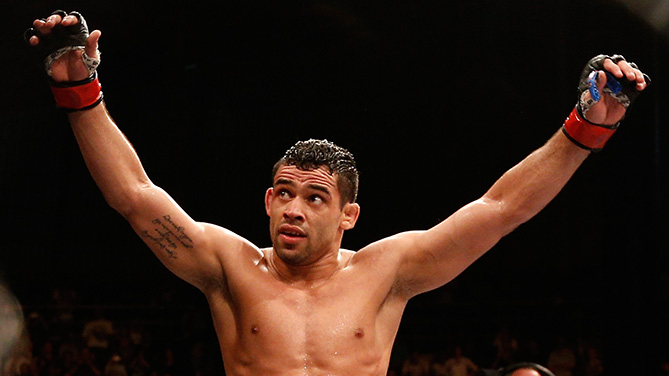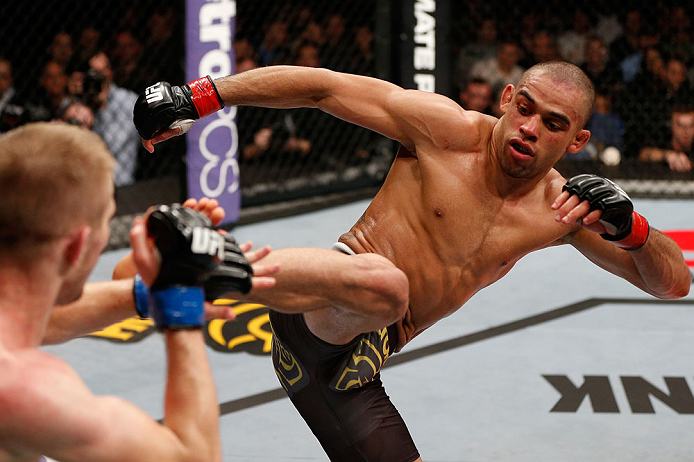
Eventos

To win a world championship in mixed martial arts like Renan Barao has, to go unbeaten in 35 fights for nine years, it takes more than talent, more than an ability to focus on fight night. For the man challenging TJ Dillashaw for the UFC bantamweight title on Saturday in Chicago, perhaps the most important part of his success is being able to be a Jekyll and Hyde of sorts, to separate his work life and his personal life.
So while Rio de Janeiro is the place where he conducts his business, home will always be the place nearly 1300 miles away, Natal, Brazil.
“A lot of people like to come and enjoy (Rio), say it’s the wonderful city,” Barao said. “But to me, Rio is a place of work, a place of focus and objectives. To me, a place for fun, to go out, that’s Natal on vacation. But when I’m here I have to focus the best I can, because I’m working to give a better life for my family.”
Barao, still just 28 years old, has given up a lot to be considered one of the best fighters in the world. His family remains in Natal, and while there are weekends for trips to  the beach, church, or the movies, the rest of the week is time for work. It’s been that way for years now, but he has no regrets about the hard and lonely times.
the beach, church, or the movies, the rest of the week is time for work. It’s been that way for years now, but he has no regrets about the hard and lonely times.
“It was very hard, this transition from Natal to Rio,” he said. “I had strong roots in my city - my whole family, people around me, it was where I was born and raised. So I felt it hard, and I was always crazy to go back. But I have my objectives. I always believe that in two months everyone will be waiting for me with open arms. So I try to keep focused.”
Those two months have been dragging on for over a year now when it comes to a rematch with Dillashaw. On the losing end of one of the biggest upsets in UFC history, Barao was slated to jump right back into the Octagon with Dillashaw last summer, before a weight-cutting mishap forced him out of the bout. Dillashaw still fought at UFC 177, defeating Joe Soto, while Barao bounced back with a December win over Mitch Gagnon. That set the rematch up once again, but this time Dillashaw was injured, taking him out of UFC 186 in April. So now it’s Chicago on Saturday, and a chance to get back what he worked so hard for over the years.
“I think I became more focused, more centered,” Barao said of the difference between May of 2014 and today’s version of “The Baron.” “I got better with my training. I used to try and train everything at once and the next day I’d be really bad. So we adjusted some things. And thank God it’s been working out.”
Many wonder if Barao will ever be the same fighter he was before Dillashaw stopped him in five rounds at UFC 173. Detractors say that he will never figure out the striking style of the Californian, even if they fought a hundred times. Supporters of the former champ say that once he got caught and dropped early, he was on auto-pilot the rest of the way, with the rematch likely being a completely different story. The truth is probably somewhere in the middle, with Dillashaw being a difficult puzzle for anyone to figure out, but Barao also being good enough to adjust and be a lot better the second time around.
 As for the opinion of the man in the Octagon that spring night in Las Vegas, Barao says of his first defeat since 2005, “when I lost, I don’t think it was good timing for me. I just think it was his day. He got a good hit right at the beginning, and the whole fight was at his pace. I think that’s what happened. It was his day, he got a good hit, and that was it. There’s no excuse to say “Nah, this and that.” No. I think it was his day, he was better, got a few good hits and won.”
As for the opinion of the man in the Octagon that spring night in Las Vegas, Barao says of his first defeat since 2005, “when I lost, I don’t think it was good timing for me. I just think it was his day. He got a good hit right at the beginning, and the whole fight was at his pace. I think that’s what happened. It was his day, he got a good hit, and that was it. There’s no excuse to say “Nah, this and that.” No. I think it was his day, he was better, got a few good hits and won.”
It’s the highest of high roads, and the voice of a man who has seen it all in this game. So he knows that some days you’ve got it, and some days you don’t. Dillashaw won fair and square, no one can say otherwise, and there’s nothing Barao can do about it except make adjustments and train for the next one. And he’s done that. So while there have been some harsh words traded between Barao’s Nova Uniao team and Dillashaw’s Team Alpha Male Squad, at least from the side of Barao, there’s respect there for his rival.
“Both teams are in the same weight classes and have great fights in the UFC, so they’re always fighting each other,” he explains. “I think that’s why it becomes a rivalry. But except for that, there is no problem. There isn’t much contact, but there is no grudge. It’s just an Octagon thing. Like I said, we both get good results, so we’re always facing each other. I think that’s what happens. All professionals, there’s no hard feelings. It’s just for sport. It’s even a motivation to train harder. And that’s it. We go up there and fight.”
Barao knows the art of the fight better than most. And he’s been doing it a lot longer than the ten years he’s been a professional.
“When I was really young I used to fight a lot in the streets,” he said. “Back then, I even decided to train capoeira. Some of my friends trained as well. Then I started jiu-jitsu. I was very hyperactive, and I would fight in school, but I realized that when I started jiu-jitsu, I became more relaxed. I’d spend a lot of energy and get calmer day by day - school, home, everywhere. So I decided to train more. Actually, it wasn’t even a very focused training. I had some friends in the neighborhood, there was a mat there and we’d play around, knock each other down. There was no technique. So that’s where it all began.”
Eventually, training got more structured, and Barao got better. So good that a trip to Rio de Janeiro was in order.
“I had my teacher, who was master Dedé (Andre Pederneiras)’s student,” he recalled. “My teacher said he had an athlete who could go on to fights around Brazil and the  world, so he decided to send me here. Right in the beginning, I was just staying for a little at a time to get some fights and get better known because I’m from Natal, and we don’t get a lot of eyes and media there. My teacher talked to Dedé, so I came here, fought at an event, and I ended up being champion. After this, I started coming to Rio more often.”
world, so he decided to send me here. Right in the beginning, I was just staying for a little at a time to get some fights and get better known because I’m from Natal, and we don’t get a lot of eyes and media there. My teacher talked to Dedé, so I came here, fought at an event, and I ended up being champion. After this, I started coming to Rio more often.”
And he never left. By 2010 he was debuting in the WEC, in 2011 the UFC called, and when he defeated Urijah Faber for the first time in 2012, he was the interim UFC bantamweight champion. 2013 was the year of two successful title defenses, and while 2014 started well when he was named undisputed champion and then stopped Faber at UFC 169, the year will most likely be remembered as the one in which he lost his title.
2015? Redemption time.
“I’m more focused now than I have ever been,” Barao said. “I’m training a lot, behaving on my diet, and he (Dillashaw) can expect a totally different Renan Barao who is very aggressive and doing whatever to bring back that belt.
“That moment was before,” he continues, referring to only his second pro loss. “Now it’s gone. Now we’re in a new moment. The goal now is getting that belt back no matter what. Get it back to its place where it never should have left. Like I said, we’re very focused, very centered. And God help us, we’ll bring it back.”